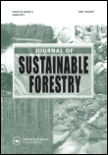
Journal of Sustainable Forestry
Scope & Guideline
Advancing sustainable practices for a greener tomorrow.
Introduction
Aims and Scopes
- Sustainable Forest Management:
Research addressing sustainable practices in forest management, including ecological, social, and economic dimensions. - Biodiversity Conservation:
Studies that explore the relationships between forestry practices and biodiversity, emphasizing conservation strategies and ecosystem services. - Climate Change Mitigation and Adaptation:
Papers focusing on the role of forests in climate change, including carbon sequestration, adaptation strategies, and impacts of climate change on forest ecosystems. - Community-Based Forestry:
Research that examines the involvement of local communities in forest management and conservation, highlighting participatory approaches and governance. - Non-Timber Forest Products:
Investigation into the sustainable use and management of non-timber resources, emphasizing their ecological and economic significance. - Forest Restoration and Rehabilitation:
Studies related to the restoration of degraded forests and the rehabilitation of ecosystems to promote resilience and sustainability.
Trending and Emerging
- Climate Resilience and Adaptation Strategies:
Increasing focus on how forests can adapt to climate change and contribute to overall resilience, including studies on adaptive management techniques and community engagement. - Ecosystem Services and Biodiversity:
A growing emphasis on understanding and quantifying the ecosystem services provided by forests, alongside their biodiversity, to inform conservation and management practices. - Agroforestry Systems:
Research on the integration of forestry with agricultural practices is trending, highlighting the benefits of multifunctional landscapes and sustainable land use. - Forest Governance and Policy:
An emerging theme around governance structures and policies that support sustainable forest management, including stakeholder engagement and community rights. - Technology in Forestry Management:
The application of new technologies, such as remote sensing and GIS, in the management and monitoring of forest resources is gaining traction, reflecting advancements in data collection and analysis.
Declining or Waning
- Traditional Logging Practices:
Research on conventional logging methods and their impacts is becoming less frequent, possibly due to a shift towards more sustainable practices and the exploration of alternative forestry methods. - Economic Valuation of Timber:
Papers specifically concentrating on the economic valuation of timber resources are declining, as the focus shifts to broader sustainability and ecosystem service frameworks. - Forest Fire Management:
While still relevant, the frequency of studies specifically addressing forest fire management strategies appears to be decreasing, possibly overshadowed by broader climate change discussions. - Invasive Species Management:
Research specifically targeting the management of invasive species in forestry contexts has reduced, as the discourse broadens to include ecosystem health and resilience.
Similar Journals
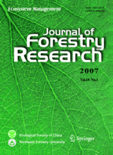
JOURNAL OF FORESTRY RESEARCH
Elevating forestry studies to new heights of excellence.JOURNAL OF FORESTRY RESEARCH, published by Northeast Forestry University in China, stands as a pivotal platform for advancing the field of forestry science. With an ISSN of 1007-662X and an E-ISSN of 1993-0607, this esteemed journal has maintained its commitment to disseminating high-quality research since its inception in 1997, converging into a recognized authority through the years. Currently boasting a Q1 ranking in the Forestry category for 2023, it ranks 18th out of 174 journals in its field on Scopus, highlighting its vital role in shaping contemporary forestry studies. The journal focuses on a broad spectrum of topics pertinent to forestry, including sustainable forest management, ecology, and conservation efforts, making it an indispensable resource for researchers, professionals, and students alike. Although it is not an open-access publication, the insights shared within its pages promise to contribute significantly to the advancement of knowledge and practices in forestry. The journal's significant impact and relevance are underscored by its operations from Harbin, People's Republic of China, where it continues to foster scholarly communication in the world of forestry research.
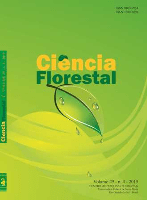
CIENCIA FLORESTAL
Elevating Global Understanding of Forest ManagementCIENCIA FLORESTAL is a premier open-access journal published by the Universidade Federal de Santa Maria, dedicated to advancing knowledge in the field of Forestry. Established in 1991, it provides a vital platform for researchers, professionals, and students to disseminate innovative research findings and methodologies. With an ISSN of 0103-9954 and an E-ISSN of 1980-5098, this journal offers extensive access options for a global audience, ensuring that key scientific discoveries in forest science are available to all. The journal is recognized for its contribution to the scholarly community, currently ranked in the Q3 category within the Forestry discipline, reflecting its commitment to quality and relevance in research. CIENCIA FLORESTAL covers a wide array of topics related to forestry practices, environmental sustainability, and biological sciences, making it an essential resource for those seeking to deepen their understanding of forest ecosystems and their management. Whether you’re a seasoned researcher or a student embarking on your academic journey, CIENCIA FLORESTAL stands as an invaluable asset in the exploration and development of forestry sciences in Brazil and beyond.
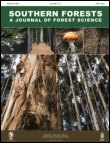
Southern Forests-A Journal of Forest Science
Driving Progress in Forest Science and SustainabilitySouthern Forests: A Journal of Forest Science, published by Taylor & Francis Ltd, serves as a vital platform for scholarly discourse in the field of forestry. With a robust ISSN of 2070-2620 and E-ISSN of 2070-2639, this journal highlights cutting-edge research and vital advancements from 2008 to 2024. Based in the United Kingdom, it continues to make significant contributions, evidenced by its current Q3 ranking in the forestry category of Scopus as well as its rank of 94 out of 174 in Agricultural and Biological Sciences. This journal caters to a diverse audience of researchers, professionals, and students, providing access to high-quality articles that promote sustainable forest management and ecological studies. Despite being classified as a non-open access journal, it remains a key resource, ensuring accessibility to crucial information that addresses both local and global forest challenges.
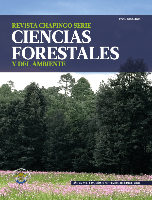
Revista Chapingo Serie Ciencias Forestales y del Ambiente
Championing open access to vital environmental research.Revista Chapingo Serie Ciencias Forestales y del Ambiente, published by Universidad Autónoma Chapingo, serves as a prominent platform for scholars and practitioners in the fields of Ecology and Forestry. Established in 2001, this open access journal has made significant strides in disseminating research that addresses pressing environmental issues, particularly within the Mexican context. With an ISSN of 2007-3828 and E-ISSN of 2007-4018, it has been recognized for its contributions, earning a Q3 ranking in both Ecology and Forestry categories as of 2023. The journal is pivotal in fostering collaboration and knowledge exchange among researchers, professionals, and students dedicated to understanding and preserving forest ecosystems. Access to its rich content is unrestricted, enhancing visibility and impact for innovative research and practical applications in sustainable management and conservation practices.

Austrian Journal of Forest Science
Exploring the intersection of ecology and forest management.Austrian Journal of Forest Science, published by OSTERREICHISCHER AGRARVERLAG, is a distinguished peer-reviewed journal dedicated to advancing knowledge in the fields of forestry and ecological science. With an ISSN of 0379-5292 and an E-ISSN of 0375-524X, this journal serves as a vital platform for researchers, professionals, and students alike, aiming to disseminate innovative research findings, methodologies, and case studies pertinent to forest conservation, management, and policy. Situated in Austria, its diverse scope encompasses critical topics within ecology, evolution, and biodiversity, evidenced by its competitive quartile rankings in 2023, placing it in Q2 for Forestry and Q3 in other related fields. The journal is committed to fostering a deeper understanding of forest ecosystems, making it an essential resource for anyone invested in sustainable forestry practices and environmental policy.

Small-Scale Forestry
Connecting knowledge and practice in small-scale forestry.Small-Scale Forestry, published by Springer, is a leading journal dedicated to advancing knowledge and research in the field of forestry, focusing particularly on sustainable practices and management of small-scale forest systems. With an ISSN of 1873-7617 and E-ISSN 1873-7854, this esteemed journal has established its significance in the academic community, evidenced by its Q2 ranking in Forestry and its position within the 69th percentile in Scopus. This journal welcomes contributions that span various themes within forestry, encompassing ecological, economic, and social dimensions, thus appealing to researchers, practitioners, and students alike. Although Small-Scale Forestry does not currently operate under an open access model, it provides critical insights that contribute to the global discourse on forest management, sustainability, and biodiversity, fostering a greater understanding of the vital role that small-scale forestry plays in environmental stewardship.

BOSQUE
Pioneering Research in Forestry and BeyondBOSQUE, published by Universidad Austral de Chile, Facultad de Ciencias Forestales, stands as a pivotal platform for advancing the field of forestry and related environmental sciences. With an ISSN of 0717-9200, this journal has been committed to disseminating original research, reviews, and case studies essential for understanding forest ecosystems and management practices since its inception in 2006. As of 2023, it holds a Q3 ranking in the forestry category, showcasing a significant yet developing influence in the broader academic landscape, evidenced by its Scopus ranking placing it at the 12th percentile in Agricultural and Biological Sciences - Forestry. While boasting a diverse range of articles, BOSQUE promotes open access to a growing community of researchers, professionals, and students eager to contribute to sustainable forest management and conservation efforts. The journal continues to foster critical dialogue and innovation, making it an invaluable resource for those dedicated to enhancing forest sciences.

FORESTRY CHRONICLE
Connecting research and real-world forestry solutions.FORESTRY CHRONICLE, published by the Canadian Institute of Forestry, is a leading journal dedicated to advancing knowledge in the field of forestry and environmental science. With a rich history of dissemination of impactful research since its inception, this journal plays a crucial role in bridging the gap between theory and practice for professionals, researchers, and students alike. Based in Canada, the journal is indexed in Scopus, ranking within the Q3 quartile for the field of Forestry and demonstrating its commitment to quality and relevance in agricultural and biological sciences. While it does not currently offer open access, its circulation extends internationally, ensuring a wide reach for innovative ideas and findings in forest management, conservation, and ecological sustainability. As a vital resource, FORESTRY CHRONICLE continues to foster dialogue and collaboration among stakeholders invested in the sustainable use of forest resources, making it an essential addition to your academic repertoire.

Revista Cubana de Ciencias Forestales
Advancing forestry knowledge for a sustainable future.Revista Cubana de Ciencias Forestales, published by UNIV PINAR RIO HERMANOS SAIZ MONTES OCA, is a vital resource in the field of forestry and environmental sciences. Since its inception in 2013, this Open Access journal has dedicated itself to disseminating high-quality research and innovations pertinent to forest ecology, sustainable management, and conservation strategies within the Cuban context and beyond. The journal aims to foster academic dialogue among researchers, professionals, and students by providing a platform for the sharing of interdisciplinary studies that address contemporary challenges in forestry. With its commitment to accessibility, Revista Cubana de Ciencias Forestales ensures that knowledge is available to a global audience, thereby contributing to the advancement of forest sciences and ecological awareness.

ANNALS OF FOREST SCIENCE
Navigating the Complexities of Forest EcosystemsANNALS OF FOREST SCIENCE, published by Springer France, stands at the forefront of ecological research, contributing significantly to both the fields of Ecology and Forestry, as evidenced by its prestigious Q1 ranking in both categories for 2023. Since its inception in 1999, this journal has become an essential resource for academics, practitioners, and students who are eager to explore the complexities of forest ecosystems and their interactions with global environmental changes. With an ISSN of 1286-4560 and E-ISSN 1297-966X, it disseminates cutting-edge research and critical reviews that enhance our understanding of forest science. Although it does not offer open access, the journal continues to be a pivotal platform for presenting innovative scientific findings that address the pressing challenges of forest management and conservation. Its significant impact factor reflects the high-quality contributions that have made a lasting mark on the discipline.